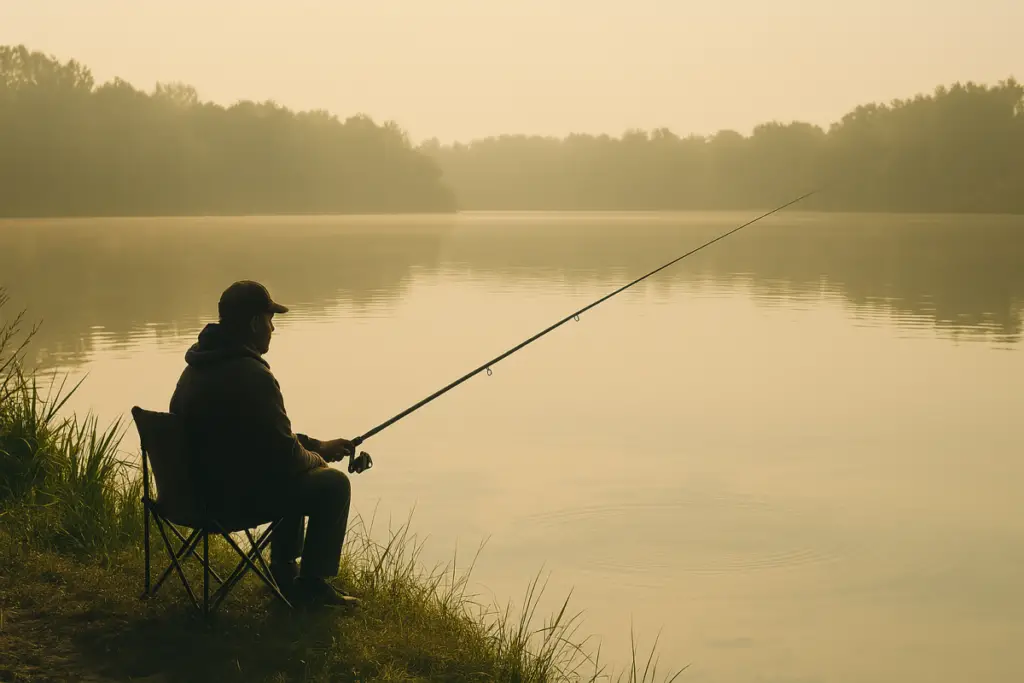
Introduction
Picture this: The gentle ripple of water, a quiet dawn, and the simple joy of waiting for a bite. As the world around you slowly awakens, you’re not just fishing—you’re immersing yourself in a moment of calm, where worries fade and nature takes center stage. Is there more to fishing than just catching fish? Absolutely.
Freshwater fishing is about more than just the thrill of the catch. It’s a holistic experience that nourishes both the body and the soul. Whether it’s the rhythmic motion of casting a line or the soothing sounds of water gently lapping against the shore, every aspect of fishing has the potential to bring about profound mental health benefits. From reducing stress to promoting mindfulness, the mental health benefits of fishing go far beyond the excitement of landing a trophy fish. Whether you’re practicing freshwater fishing therapy or engaging in relaxing fishing techniques, the positive impact on well-being is undeniable.
In this article, we’ll explore why fishing is much more than a hobby—it’s a pathway to better mental health. We’ll dive into how fishing can act as a form of meditation, a stress reliever, and a community builder, all while offering physical benefits that enhance well-being. So grab your fishing rod, and let’s discover how you can find your zen on the water.
Fishing as a Form of Meditation
Mindfulness on the Water: The Meditative State of Fishing
Fishing’s repetitive actions—like casting and reeling—can put anglers in a meditative state. The rhythmic movements, coupled with the tranquility of the water, allow the mind to slow down and focus on the present.
- Repetition creates a calming routine
- Nature immersion reduces anxiety
- Slow, deliberate actions foster mindfulness
Studies from the American Psychological Association (APA) highlight that nature immersion can significantly reduce cortisol levels and alleviate symptoms of anxiety.
Focusing on the Present Moment
Fishing naturally encourages presence. Whether watching the line ripple or feeling the subtle tug of a fish, anglers become absorbed in the moment, reducing racing thoughts and anxiety.
- Be mindful of sights and sounds
- Focus on each motion and movement
- Let thoughts flow without judgment
Mental health professionals even recommend fishing as a therapeutic practice for those struggling with stress.
Stress Relief Through Nature Connection

The Calming Effect of Water Sounds
Natural sounds, like the lapping of water or the soft hum of insects, trigger relaxation responses in the brain. Research from the National Institute of Mental Health (NIMH) supports that outdoor sounds reduce stress and enhance mood, offering relief from symptoms of depression.
- Water sounds are inherently calming
- Outdoor environments foster relaxation
Solitude Without Isolation: Finding Peace in Nature
Spending time alone on the water doesn’t mean feeling lonely. Fishing provides a perfect balance of solitude and connection, allowing for self-reflection while anticipating a catch.
- Solitude fosters self-awareness
- Being alone doesn’t equate to loneliness
- Nature reduces stress without social pressure
Physical Benefits That Boost Mental Well-Being
| Benefit | Description | Example |
|---|---|---|
| Light Exercise | Improves cardiovascular health and muscle strength | Rowing, casting, wading while fishing |
| Vitamin D from Sunlight | Boosts mood, combats Seasonal Affective Disorder | Early morning or late afternoon fishing sessions |
| Fresh Air | Enhances mental clarity and reduces stress | Spending hours by the water, breathing fresh air |
The Health Boost of Light Exercise
Fishing involves more physical activity than many realize. Rowing, casting, and wading engage muscles, promoting cardiovascular health. According to the Centers for Disease Control and Prevention (CDC), outdoor activities, including fishing, improve both physical and mental clarity.
Vitamin D and Fresh Air: A Natural Antidepressant
Spending time outdoors while fishing increases Vitamin D levels, combating Seasonal Affective Disorder (SAD) and boosting mood. Anglers can maximize benefits by choosing safe sun exposure practices.
Social Connections and Community Building
| Social Benefit | How It Helps | Example |
|---|---|---|
| Group Bonding | Builds friendships and social support | Fishing with friends or in community clubs |
| Mentoring Opportunities | Creates purpose and strengthens connections | Teaching fishing techniques to newcomers |
| Story Sharing | Fosters a sense of belonging and pride | Sharing fishing stories and tips with others |
The Bonding Power of Group Fishing
Fishing with friends or joining local fishing clubs strengthens social connections. Sharing stories, tips, and successes fosters a sense of belonging and support.
Mentoring and Passing Down Traditions
Teaching someone to fish builds purpose and connection. One seasoned angler mentored his grandson, creating a legacy of shared skills and peaceful mornings on the water.
Finding Your Zen: Tips for Mindful Fishing

Choosing the Right Spot for Relaxation
Opt for quieter, less crowded fishing spots to enhance mindfulness. Finding the perfect location is not just about the fish—it’s about creating a space where your mind can truly unwind and connect with nature.
- Avoid busy, noisy areas where distractions are common.
- Find balance between fishing success and tranquility—sometimes, less active spots offer more peace.
- Choose locations known for scenic beauty, such as lakes with lush surroundings or riverbanks shaded by trees.
- Experiment with different spots to find the one that feels most peaceful to you.
- Check the weather and plan accordingly to avoid unexpected stress from harsh conditions.
- Pick spots that offer both shade and sunlight, allowing for comfort throughout your fishing session.
- Look for areas where wildlife activity is present, as it can enhance the sense of being immersed in nature.
- Consider bringing a portable chair or mat to make the spot more comfortable for longer stays.
Creating a Calming Routine
Consider incorporating breathing exercises before casting. Establishing a fishing routine can make the experience more mentally rejuvenating. A routine helps set the tone for relaxation, signaling to your mind that it’s time to let go of stress.
- Practice slow, deep breaths before each cast to calm your thoughts.
- Visualize a successful, peaceful fishing experience before you even start.
- Incorporate gentle stretches before setting up your gear to loosen tension.
- Bring calming elements like a thermos of tea, herbal drinks, or soft background music to enhance the peaceful atmosphere.
- Use a simple, organized setup to minimize stress while preparing your fishing gear.
- Keep a small journal to note peaceful moments, reflections, or even simple observations about the water and surroundings.
- Set a personal intention for each fishing trip—whether it’s to relax, reflect, or simply enjoy the moment.
- Carry a small mindfulness object, like a smooth stone, as a physical reminder to stay present.
Frequently Asked Questions (FAQs)
- Can fishing really help with anxiety and stress?
- Yes! Fishing promotes mindfulness, reduces stress hormones, and provides a sense of calm.
- Are there specific fishing techniques that are more relaxing?
- Techniques like fly fishing, which involve repetitive movements, are particularly meditative.
- Do you need to catch fish to experience the mental health benefits?
- Not at all! The act of fishing itself—regardless of the catch—offers relaxation and peace.
- Can group fishing be just as beneficial as solo trips?
- Absolutely! While solo fishing offers solitude, group fishing builds social bonds that support mental well-being.
Conclusion
Freshwater fishing is far more than just a pastime—it’s a lifeline for mental well-being. In a world filled with constant noise and endless to-do lists, fishing offers a rare opportunity to reconnect with nature, oneself, and others.
By embracing the simple act of casting a line, anglers unlock a world of stress relief, mindfulness, and social connection. Whether you’re savoring the solitude of solo fishing or enjoying the camaraderie of group outings, the mental health benefits are undeniable. It’s about more than just catching fish—it’s about catching your breath, finding your rhythm, and letting the water wash away life’s worries.
So the next time you’re looking for a way to unwind and recharge, consider the timeless therapy of freshwater fishing. You might just find that the peace you’re seeking has been waiting on the water’s edge all along.
